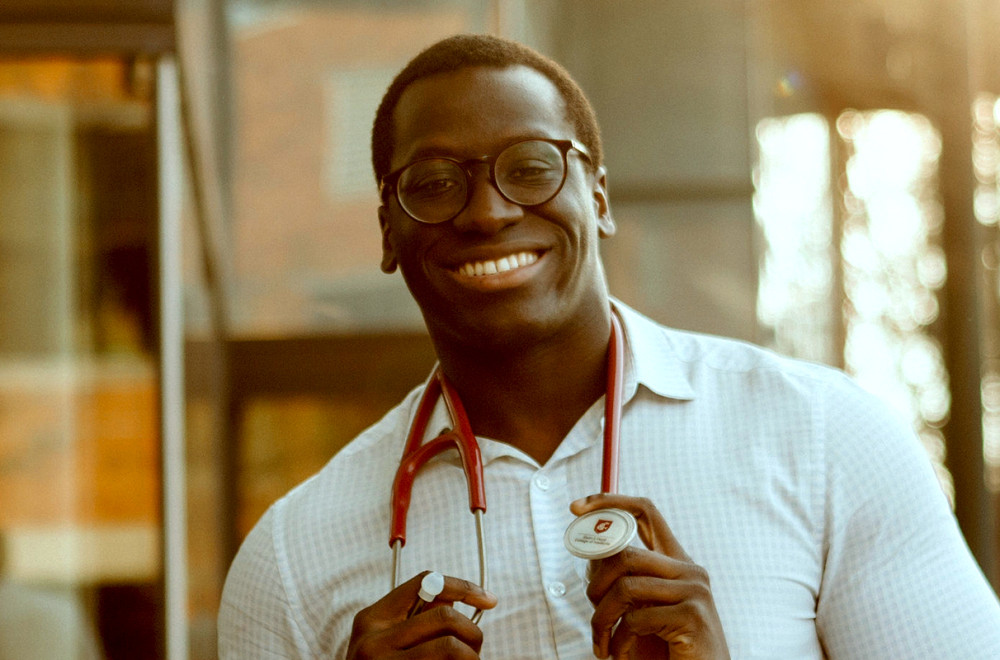WSU med student fights racial bias in health one TikTok at a time
Tuesday, February 15, 2022

Joel Bervell has turned an app known for quirky videos and dance memes into a tool for social change.
At WSU Elson S. Floyd College of Medicine, Bervell is a hardworking third-year medical student, but on TikTok, the 26-year-old is better known as the “Medical Mythbuster” for creating videos highlighting racial disparities in medicine. He has more than 400,000 followers with videos earning more than 10 million likes. TikTok recently named him among its top ten changemakers.
One of his first videos, for example, features the pulse oximeter, a device that measures blood oxygen saturation levels often used to assess COVID-19 patients. Research shows it can overestimate those levels on darker skin, a difference that could mean inadequate treatment for Black patients. The video blew up online. Bervell has since highlighted many more disparities in U.S. healthcare, including faulty race-based equations in kidney function and misperceptions that Black skin is somehow thicker.
“Most of these health disparities exist not necessarily because of individual prejudice but because they are built into our systems,” said Bervell. “Many of us don’t know about them because they’re already encoded, and it’s not talked about enough.”
Bervell has made it his mission to get people talking using one-minute videos about related studies. While many doctors and nurses follow his videos, he aims to make them accessible to anyone.
“I try to approach this knowing most people have never heard about this: so how do I explain it to them in a way so that they feel what I’m feeling?” he explained. “Often, I don’t embellish anything. I just put the facts as they are and leave the breadcrumbs for people to come to the same realization that I did.”
Bervell’s advocacy speaks directly to this year’s Black History Month’s focus on Black health and wellness, but he’s also using his platform to run a series highlighting Black leaders in history such as tennis star Arthur Ashe and sculptor Selma Burke. In addition to his social media work and his medical studies, Bervell has started a mentorship program to recruit more underrepresented students to WSU’s College of Medicine. He also served as student body president last year. He’s currently undertaking his clinical rotations in Vancouver, Washington.
“Joel is a shining example of our mission to address challenging healthcare environments in the state of Washington – and that absolutely includes racism in medicine,” said Leila Harrison, the College of Medicine’s senior associate dean for admissions and student affairs. “We want to help find solutions for problems in populations that suffer disproportionately in healthcare. Joel is doing exactly that because he’s providing education and awareness about underserved and marginalized people.”
With an undergraduate degree from Yale and a master’s from Boston University, Bervell had a choice of several medical schools. The mission and the college’s very name led him to choose the new medical school developing in Eastern Washington three years ago.
“It’s one of the few schools in the United States that’s named after a Black man,” said Bervell. “And I liked the fact that the college has such an emphasis on leadership and helping students develop into not just great doctors but great leaders, which is something that’s becoming increasingly important.”
Born in Canada to immigrant parents from Ghana and raised in a small town north of Seattle, Bervell has always felt as if he has straddled different worlds. He also saw early on what medical disparities can mean when his grandmother died in Ghana from a malarial infection that could have easily been managed in the U.S. While still in high school, Bervell and his siblings started a nonprofit in her honor, Hugs for Ghana, to raise funds for school and medical supplies to benefit Ghanaian children.
Now Bervell is considering a career as an orthopedic surgeon but plans to continue his work around bias in medicine because it impacts real people. One viewer even wrote to say he had a condition called acral lentiginous melanoma diagnosed and treated after seeing one of Bervell’s videos.
TikTok has also awarded Bervell a $50,000 Black Creative Grant to create his dream project, and he’s currently working on a podcast.
Bervell’s successful advocacy shows how important it is for the WSU community to understand the experiences of students, said Harrison.
“Education is sometimes slow to change, and it can be uncomfortable,” she said. “We need to continue to listen to our students, and in particular those who come from minoritized or marginalized backgrounds. We need to hear what they’re sharing about their experiences and what they’re advocating for.”
For his part, Bervell said that young people don’t need to wait to start working on issues they are passionate about.
“We live in a world now where you can affect change without leaving your room,” he said. “Everyone has the ability to be able to make change. It just takes that first step.”